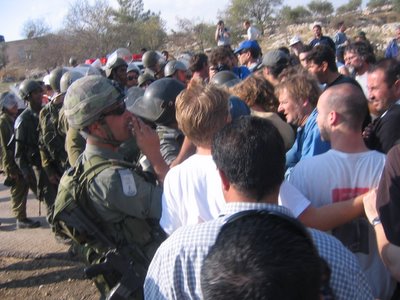Protest as performance

Every Friday, a motley collection of several dozen Europeans, who call themselves “political tourists,” Palestinians and Israeli leftists gather to protest near bulldozers that are working to construct the barrier that Palestinians fear will become the border between Israel and a future Palestinian state. The barrier cuts inside the 1948-cease fire line that delineated Israel from the West Bank. It separates thousands of acres of Palestinian agricultural land, as well as some Palestinian villages, from the rest of the West Bank.
The protest yesterday passed mostly peacefully, which may have been a disappointment to both sides. Since I have arrived in Ramallah, Palestinian newspapers have run front-page photos from the weekly protest showing demonstrators being beaten and kicked by Israeli soldiers and border police. On Friday, about 50 protestors chanted “the wall must fall,” in Arabic and Hebrew. About as many soldiers and border police stood by uneasily, some twitching their index fingers next to the triggers on their M-16s. At first the demonstrators sat and chanted, but when that didn’t elicit much response from the soldiers, they stood and tried to march toward the barrier – which in this spot, was already completed.
The most excitement came when soldiers engaged in a shoving match with protesters, pushing them down a rocky slope. One Israeli man with long curly hair was detained briefly and then released. Then, Palestinian boys threw stones toward the soldiers. They were more than 100 yards away, but the soldiers pursued them anyway, launching tear gas, playing a game-and-cat and mouse in a nearby olive grove. This continued for hours, long after the protest ended. It all seemed well-rehearsed. Some older Palestinians sat on a farmer’s stone wall under a shade tree, watching the spectacle unfold from a distance, cheering on the boys, as if watching some reenactment of a Civil War battle.
The weekly protest takes place in Bilaeen, which stands to lose half of its agricultural land to the Israeli side of the barrier. The protestors argue that the barrier here has less to do with security concerns than with the planned expansion of three nearby Jewish settlements, considered illegal by the United Nations because they are built on occupied land. The barrier itself was ruled illegal by the International Court of Justice in the Hague. None of that has stopped construction of the wall. And so, the protests likely will continue.

0 Comments:
Post a Comment
<< Home